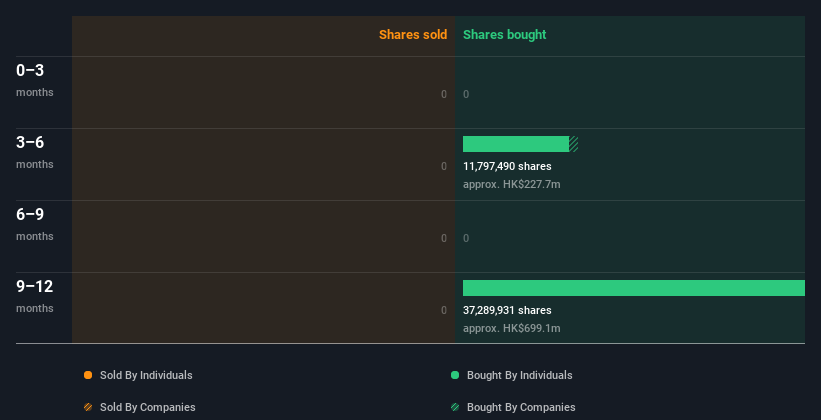- Hong Kong
- /
- Real Estate
- /
- SEHK:247
One Tsim Sha Tsui Properties Insider Raised Their Stake In The Previous Year
Looking at Tsim Sha Tsui Properties Limited's (HKG:247 ) insider transactions over the last year, we can see that insiders were net buyers. That is, there were more number of shares purchased by insiders than there were sold.
While insider transactions are not the most important thing when it comes to long-term investing, we would consider it foolish to ignore insider transactions altogether.
View our latest analysis for Tsim Sha Tsui Properties
Tsim Sha Tsui Properties Insider Transactions Over The Last Year
In the last twelve months, the biggest single purchase by an insider was when Executive Chairman Chee Siong Ng bought HK$699m worth of shares at a price of HK$18.74 per share. So it's clear an insider wanted to buy, even at a higher price than the current share price (being HK$17.60). While their view may have changed since the purchase was made, this does at least suggest they have had confidence in the company's future. In our view, the price an insider pays for shares is very important. As a general rule, we feel more positive about a stock when an insider has bought shares at above current prices, because that suggests they viewed the stock as good value, even at a higher price. The only individual insider to buy over the last year was Chee Siong Ng.
Chee Siong Ng bought a total of 48.16m shares over the year at an average price of HK$18.87. You can see a visual depiction of insider transactions (by companies and individuals) over the last 12 months, below. If you want to know exactly who sold, for how much, and when, simply click on the graph below!

Tsim Sha Tsui Properties is not the only stock that insiders are buying. For those who like to find small cap companies at attractive valuations, this free list of growing companies with recent insider purchasing, could be just the ticket.
Insider Ownership
Looking at the total insider shareholdings in a company can help to inform your view of whether they are well aligned with common shareholders. I reckon it's a good sign if insiders own a significant number of shares in the company. Tsim Sha Tsui Properties insiders own about HK$25b worth of shares (which is 66% of the company). Most shareholders would be happy to see this sort of insider ownership, since it suggests that management incentives are well aligned with other shareholders.
What Might The Insider Transactions At Tsim Sha Tsui Properties Tell Us?
It doesn't really mean much that no insider has traded Tsim Sha Tsui Properties shares in the last quarter. But insiders have shown more of an appetite for the stock, over the last year. Judging from their transactions, and high insider ownership, Tsim Sha Tsui Properties insiders feel good about the company's future. So these insider transactions can help us build a thesis about the stock, but it's also worthwhile knowing the risks facing this company. At Simply Wall St, we found 1 warning sign for Tsim Sha Tsui Properties that deserve your attention before buying any shares.
Of course, you might find a fantastic investment by looking elsewhere. So take a peek at this free list of interesting companies.
For the purposes of this article, insiders are those individuals who report their transactions to the relevant regulatory body. We currently account for open market transactions and private dispositions of direct interests only, but not derivative transactions or indirect interests.
Valuation is complex, but we're here to simplify it.
Discover if Tsim Sha Tsui Properties might be undervalued or overvalued with our detailed analysis, featuring fair value estimates, potential risks, dividends, insider trades, and its financial condition.
Access Free AnalysisHave feedback on this article? Concerned about the content? Get in touch with us directly. Alternatively, email editorial-team (at) simplywallst.com.
This article by Simply Wall St is general in nature. We provide commentary based on historical data and analyst forecasts only using an unbiased methodology and our articles are not intended to be financial advice. It does not constitute a recommendation to buy or sell any stock, and does not take account of your objectives, or your financial situation. We aim to bring you long-term focused analysis driven by fundamental data. Note that our analysis may not factor in the latest price-sensitive company announcements or qualitative material. Simply Wall St has no position in any stocks mentioned.
About SEHK:247
Tsim Sha Tsui Properties
An investment holding company, invests in, develops, manages, and trades in properties primarily in Hong Kong, Mainland China, Singapore, and Australia.
Flawless balance sheet established dividend payer.
Similar Companies
Market Insights
Weekly Picks

Solutions by stc: 34% Upside in Saudi's Digital Transformation Leader


The AI Infrastructure Giant Grows Into Its Valuation
Recently Updated Narratives


The "Sleeping Giant" Wakes Up – Efficiency & Monetization


The "Rate Cut" Supercycle Winner – Profitable & Accelerating


The Industrialist of the Skies – Scaling with "Automotive DNA
Popular Narratives


MicroVision will explode future revenue by 380.37% with a vision towards success


NVDA: Expanding AI Demand Will Drive Major Data Center Investments Through 2026



